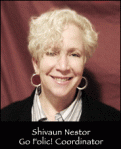Today is the 19th annual National HIV Testing Day. More than 1 million people are living with HIV in the United States, but 1 in 5 don’t know they are infected. This makes testing one of our best prevention tools. If everyone in the U.S. who had HIV knew their status, we’d be one step closer to a world without HIV/AIDS.
I started my career in public health as a health educator in the late 1980s. One of the first projects I worked on was the Wedge Program, the first HIV education program for youth to make HIV+ speakers a focus of AIDS education. I got to know and love many of the women and men who so bravely shared their stories at a time when HIV+ people were still being fired, denied health care, and ostracized by their families.
This was also a time when most people were diagnosed as HIV+ after they’d already progressed to AIDS and the only treatment available was AZT, which by itself wasn’t very effective. I lost many of the people I loved to the disease at that time, watching them succumb to the cancers, pneumonia, or mental decline that seemed an almost inevitable part of an HIV diagnosis back then.
Times have changed a lot since then.
With current treatments, HIV is a chronic disease rather than a death sentence. HIV+ people now have workplace protections and, specially in the Bay Area, are no longer stigmitized as they once were. I celebrate that many of my HIV+ friends survived to see and benefit by this day. I still miss those who did not.
They key is for everyone to get tested for HIV at least once.
The key to living well with HIV is finding out one’s status early enough to stop the virus from progressing. This is also one of the keys to a future world in which HIV no longer exists. That is why health professionals now recommend that everyone aged 15 to 65 get tested for HIV infection at least once. And people with a higher risk for the infection should get tested at least annually.
 Getting tested is especially important for women who are pregnant or men and women who are planning a pregnancy. While in the early days of the epidemic, many babies born to HIV+ mothers also had HIV, that is no longer the case. Medical experts now know how to help an HIV+ person safely conceive. Also, if an HIV+ woman gets proper treatment during pregnancy, she has a very excellent chance of giving birth to a baby born without HIV. Click here to learn more.
Getting tested is especially important for women who are pregnant or men and women who are planning a pregnancy. While in the early days of the epidemic, many babies born to HIV+ mothers also had HIV, that is no longer the case. Medical experts now know how to help an HIV+ person safely conceive. Also, if an HIV+ woman gets proper treatment during pregnancy, she has a very excellent chance of giving birth to a baby born without HIV. Click here to learn more.
My Testing Experience
I got tested for HIV in the mid-80s. I’d just found out that a friend and former sexual partner had been diagnosed with AIDS. At that time, you had to wait two weeks to get your results. The two weeks of waiting were extremely difficult. I was not in a relationship at the time, but was fearful not only of the diagnosis, but of how I would tell my family, as well as my ex-girlfriend that she might be at risk.
By the time I went to get my results, I had not slept for two nights and was feeling very anxious. However, the my test counselor (I went to Castro-Mission Health Center) was wonderful and put me at ease before I got my results. After telling me that they were negative (meaning I didn’t have HIV), she helped me to figure out: 1) how to make sure that I protected myself from then on; 2) how to use the emotions I experienced during the test process to become a better health educator.
Knowing your status is empowering!
I felt relieved and empowered when I got my results. I am thankful that I got tested when I did because it helped me both personally and professionally.
We can all make mistakes, especially when it comes to love and lust. Which is one of the reasons it’s so important for everyone to get tested at least once.
If you find out that you are infected with HIV (if you test positive), you can seek medical care and live a longer, healtheir life. It will also lower your chance of passing HIV to others. If you find out that you don’t have HIV, you can take steps to stay that way.
Have you been tested?
If you live in San Francisco, follow the San Francisco AIDS Foundation mobile testing van on Twitter @testmeSF. If you don’t live or work in San Francisco, or if you’d prefer getting tested at a clinic, you can find an HIV testing site near you by using the CDC’s STD and HIV testing site locater.
 This post is dedicated wtih love to my friend, Danny Keenan, who worked to establish one of the Nation’s first treatment programs for HIV+ youth, at Larking Street Youth Services.
This post is dedicated wtih love to my friend, Danny Keenan, who worked to establish one of the Nation’s first treatment programs for HIV+ youth, at Larking Street Youth Services.
~ Shivaun Nestor, Go Folic! Coordinator
